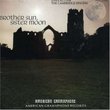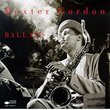| All Artists: Wilhelm Backhaus Title: Great Pianists of the 20th Century - Wilhelm Backhaus Members Wishing: 1 Total Copies: 0 Label: Philips Release Date: 10/20/1998 Genre: Classical Styles: Chamber Music, Forms & Genres, Concertos, Sonatas, Historical Periods, Classical (c.1770-1830), Romantic (c.1820-1910) Number of Discs: 2 SwapaCD Credits: 2 UPC: 028945671826 |
Search - Wilhelm Backhaus :: Great Pianists of the 20th Century - Wilhelm Backhaus
 | Wilhelm Backhaus Great Pianists of the 20th Century - Wilhelm Backhaus Genre: Classical
|
Larger Image |
CD DetailsSimilarly Requested CDs
|
CD Reviews"We shall never live so long or know so much" 10/23/1998 (5 out of 5 stars) "Wilhelm Backhaus was one of the greatest Beethoven players who ever lived. He was as objective as Schnabel, as passionate as Serkin and as explosive as A. Fischer. This CD documents his historic return to the U.S. after an absence of some 28 years. His legendary Carnegie Hall Recital (which is released on this double CD for the first time in its entirety) was taped on March 30, 1954. He was 70 years old and at the summit of his powers. His genius for capturing Beethoven's incomparable drive with note perfect form is heard here in almost every bar. He played 5 Beethoven sonatas and then 5 encores. There is no more exciting performance of the "Pathetique" available on CD. The "Tempest" is played as though he were possessed (he loved this sonata and played it frequently in recitals); the last mvt. is almost savage in its fury. His C-minor, the last of the 32 sonatas of Beethoven is perhaps the greatest performance on the 2 discs. It only has two movements - sometimes referred to as Sansara and Nirvana. What is obvious is that the first movement is a metaphor for the strife of the world and the second movement is something far removed from that strife. For many it is a meditation on eternity. Backhaus' genius is manifested here with startling intensity. I would suggest earphones (if you have them) for this sonata - No. 32. The encores (Schubert, Schumann, Chopin and Brahms) are wonderful too and the sheer intellectual and emotional power of this musician is captured forever on this remastered re-release. Backhaus is not for the "world's 100 most beautiful melodies" crowd. He is a musician for adults with brains. There is also included a performance of the Brahms 2nd Piano Concerto with Carl Schuricht and the Vienna Philharmonic Orchestra recorded in 1952. Backhaus was a fine Brahms player. But it is in Beethoven that his genius is most fully realized here. If you have ever wondered who Beethoven was, Backhaus can lead you to him. The rewards of this music are inexhaustible. And the sound on these discs is excellent! Backhaus played a Bosendorfer piano and you have to hear it to believe it. Philips has done a fine job with the digital remastering and the notes are first rate. The great man died on July 5th, 1969. He is buried in Cologne, Germany." Stupendous, little known virtuoso. Augustus Caesar, Ph.D. | Eugene, Oregon United States | 10/17/2000 (5 out of 5 stars) "Wilhelm Backhaus, who lived from 1884 to 1969, was one of the finest pianists of the 20th century. Backhaus first gained international fame in 1905, when he defeated some of the most phenomenal pianistic talents of his day at the Rubinstein Competition (second place went to Bela Bartok, who spoke disparagingly of Backhaus ever after). Backhaus was one of the colossal Beethoven players who ever lived, but his repetoire also included Brahms (another one of his specialties), Schubert, Schumann, Haydn, Rachmaninoff, Mozart, Handel, Debussy and Chopin. In interpreting Chopin, Backhaus showed that he wasn't "the performing metronome" (to quote the ever-vengeful Bartok), but an artist of unusual grace and sensitivity. These CDs feature mostly Beethoven (of course), and also small amounts of Schumann, Lizst, Schubert and Chopin. Backhaus' playing was one of restraint, superb control and technique and supreme elegance. Gyorgy Sandor called his style "understated, tremendous pianism," and these recordings prove that statement true. On a purely technical level, Backhaus was transcendental. Indeed, there have been only a handful of players (Rachmaninoff, Hofmann, Michelangeli, Horowitz, Bolet, Lhevinne and perhaps Wild and Katchen) in the 20th century who rivalled him in terms of sheer physical command of his instrument. There are few surprises in Backhaus' playing; this is a pianist for whom there is no danger of wrong notes or smudged passages. Like Rachmaninoff, Backhaus presents the music in the most straighforward, direct manner possible. There is a monumental solidity to his playing that was unique. Backhaus was't given to affectation, sentimentality or mannerism: this is virtuosity played with keen intellect, and while he has often been described as cold, I find an undercurrent of emotion to almost every note Backhaus plays. Backhaus was relatively unknown the US compared to the likes of Horowitz or Rubinstein, but he was every bit their equal as a pianist and I highly recommend these fine performances to anyone who cares about great music." The magic of Backhaus G Pelloni | Cottingham, East Yorkshire United Kingdom | 08/10/2004 (5 out of 5 stars) "This box-set is a must have. An accurate and representative testimonial of Wilhelm Backhaus's art. It contains Backhaus's performance of Brahms piano concerto in B flat with the Vienna Philharmonic under the baton of Carl Schuricht. It is absolute magic. It is one of the wonders of the gramophone. Far superior to the joint collaborations of Backhaus and Bohm. To my ears only Fischer and Furtwangler reached the same level of supreme artistry in this work. Unfortunately superb efforts by Richter and Schnabel are undermined by bad recording quality or inadequate conducting. Gilels-Jochum and Arrau-Giulini are very, very good but perhaps not in the same class.
Brahms B flat major concerto is one of the main hurdles of the pianistic repertoire, requiring dazzling technique associated with a deep interpretative sensitivity. Only the giants would emerge unscathed. Backhaus delivers the concert's agilities with a vivid, transparent and pure sound. His trenchant staccatos, his rock-like trills a (listen to the end of the first movement exposition for a clear example) leave the listener spellbound. The clarity of sound, the absence of any sound "thickening" reveal the long melodic line, the structural relationship of sounds and themes. Backhaus legato, may be, is not as magical as Schnabel's, but flows seamlessly. His use of rubato is discrete and sensitive always in line with his structural view of the long line. The artistic partnership with Schuricht and the VPO is one of those meetings of kindred spirits which are destined to leave indelible performances. Schuricht possesses the same depth of feeling and technical prowess of Backhaus. The VPO responds, as she only can, to the efforts of these two masters. What about the rest. Backhaus Beethoven confirms why he was considered one of the 20th century outstanding interpreters of the "grand sourd". Schumann's "warum" is delivered softly with a murmuring sound so as to project the image of a mystery that cannot be unveiled. A mystery of which we can catch a glimpse from afar with a serene spirit. Superb. And so it is the rest. Finally the booklet notes are excellent, devoid of all those silly statements about Backhaus "gruff good humour" or "his excessively abrupt directness" which infest the writings of many (fortunately not all) British music critics. The notes are written by pianist and musicologist Piero Rattalino, somebody who has heard Backhaus live many times and who can examine the art of interpretation not as an outsider. " |

 Track Listings (10) - Disc #1
Track Listings (10) - Disc #1







![Across The Universe [Deluxe Edition]](https://nationalbookswap.com/cd//m/51/1251/1241251.jpg)
